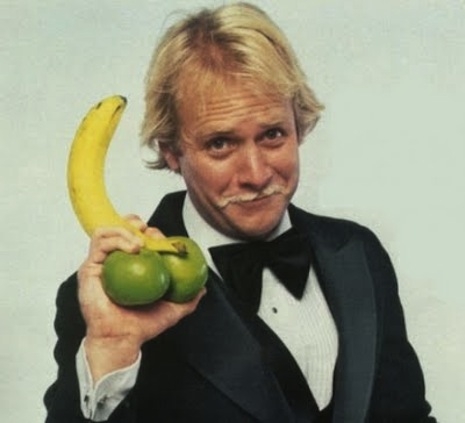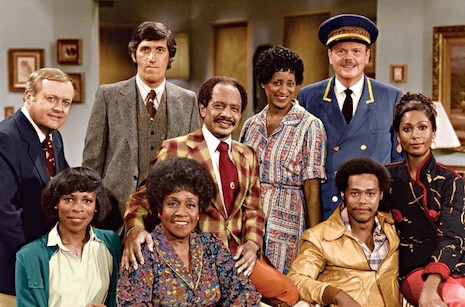
This week has brought us the remarkable phenomenon of the President of the United States appearing on Zach Galifianakis’ brilliant Funny or Die interview series “Between Two Ferns,” a delicious bit of anti-comedy that one would have thought would be too “out there” for the likes of Barack Obama (Refreshing to be proven wrong on that point.) The concept behind “Between Two Ferns” is that Galifianakis, trading on his new status as a bona fide movie star, interviews a big celebrity but without having the slightest notion of what he’s doing and, most often, revealing, eventually, some obscure animus towards his guest. (The Bradley Cooper episode, referenced by Obama, is a classic in this regard.) It’s the state-of-the-art of awkward “cringe” humor, wherein the mirth arises out of the show’s refusal to successfully ape the conventions of a properly run talk show, of which there are plenty if you like that sort of thing. The cringeworthiness of the proceedings seems pointless, but it’s inherently subversive, as it takes a functioning thing and breaks it to investigate the underlying premises. (The Eric Andre Show on Adult Swim, which is brilliant, is a high-energy, “mayhem” version of the same concept.)
I’ve been watching Galifianakis do his marvelously fractured and “aggressive” standup since 2006 or so, and his career trajectory from the basement of the UCB Theater to the Oval Office has been a gratifying one to see, for me at least. The concept of the “broken” talk show doesn’t start with him, of course, as he’d be the first to admit. It goes back at least as far as the demented antics of Monty Python’s Flying Circus, if not earlier. On this continent, we have SCTV and Saturday Night Live, of course—both produced countless fantastic talk show satires—but the most sustained precursor is certainly Norman Lear’s Fernwood 2Night, starring the unforgettable duo of Martin Mull as the egocentric host Barth Gimble and Fred Willard in the Ed McMahon slot as the winningly obtuse Jerry Hubbard.
Fernwood 2Night was a spinoff of Lear’s groundbreaking “anti-soap opera” Mary Hartman, Mary Hartman, a soap opera set in the ineffably American town of Fernwood, Ohio which ambitiously generated a whopping 325 episodes in its short run. (Richard has rhapsodized about the recently issued box set on DM before; you can buy the DVD set here.) Essentially, the idea behind Fernwood 2Night was of what we would today call a local cable-access talk show—except the host doesn’t seem to realize that he’s a penny-ante local idiot. As with Mary Hartman, Mary Hartman, the humorous condescension towards small-town America was built in, but showed a lot of affection for it at the same time.
In addition to “Between Two Ferns,” another clear heir to Fernwood 2Night is Will Ferrell’s sleeper 2004 hit Anchorman. In Anchorman, Ferrell’s clueless and egotistical Ron Burgundy is the Barth Gimble figure, and instead of a single partner, is surrounded by a passel of sycophantic, over-confident idiots. However, it’s clear that the Jerry Hubbard slot is occupied by the impossibly stupid Brick Tamland, played by Steve Carell. And don’t forget: the acknowledgment of a debt to Fernwood 2Night is clear in the casting of Fred Willard to play station director Ed Harken. (Similarly, Galifianakis’s choice to do his show between two FERNS seems like an obvious shout-out, as well. Maybe not.)
The recent newsworthiness of “Between Two Ferns” reminded me of an appearance Martin Mull made on The Kevin Pollak Chat Show (itself a take on Charlie Rose) in 2010 in which he discussed the origins and concept of Fernwood 2Night (which in its second season became America 2Night to enable to allow Barth Gimble to make less contrived use of LA celebrity culture).
I’ve linked the video below: the relevant portion starts around the 42nd minute and lasts about 12 minutes. I’ve taken the trouble to transcribe a healthy portion of it for posterity’s sake. I’ve cleaned up the inevitably awkward nature of spoken communication slightly, as well as editing out most of host Pollak’s questions and comments. A few corners are cut in the name of readability, but nobody listening along could rightfully say I’ve misrepresented Mull anywhere. It’s very long but there’s actually quite a bit more in the video, so keep listening.
Well, first of all, acting with Fred Willard, it’s like following someone who refuses to use their turn signals. You have no idea where he’s going, ever, and that was fabulous. Was it heavily scripted? Yes. … There was one show, we were … two minutes short, and Norman Lear said, “Can you guys improvise something?” And Fred and I had just met on the set. This was after about the first two weeks, and he said “Can you improvise something?” and we said, “Sure.” And we said [conferring], “Why don’t you say that and I’ll say that—Okay.” And we ended up about 18 to 20 minutes over. And they liked it enough so that they cut back on some of the other stuff. So from then on, it was more, bullet points. That what I would know is, “Your guest today is Kevin Pollak, Kevin claims to have been abducted by people from Mars, he and his girlfriend. Apparently all they wanted to do was talk to the girlfriend, but not about her but about Kevin. That’s all you need to know.” … So we’d have that much information and then we could just go with that.
The chemistry was an absolute tangible commodity, too. We did a thing, it’s been 30 years, and [in the winter of 2008-09] we were asked to go to San Francisco to this comedy fest, to recreate [Fernwood 2Night] in a club, they said, “We’re just going to do 25 minutes of clips, and then you guys come out, and if you could do 10-15 minutes in character”—and I was like, Oh my god, I mean that was 30 years ago—“and then we’ll do Q&A.” … It took 90 seconds—tops—to fall right back into it. Fred and I were right there and we brought people up from the audience as our guests, etc., and then left the stage and came back five minutes later for Q&A, and I realized why we fell back right into it, is that there was no difference between the characters between who we really are and those characters. There was no acting involved! I am a pompous ass, and he’s an idiot! It’s a palpable thing.
I had never acted in anything, unless you want to count my draft physical, and I had been reading for things, when I decided that the road giveth and the road taketh away, I’m gonna try to be an actor or something. … and had been excused from most readings before even finishing the paragraph. And meanwhile I had gone to see Norman Lear about possibly writing on Mary Hartman, and we had a lovely meeting, I liked him a lot, and he said, “We don’t need any writers but it’s been nice meeting you.”
Six months later I’m in the middle of a mix on an album—and a bottle of Courvoisier—about halfway through both, and I get a call, “You’re gonna read for Mary Hartman tomorrow,” and I thought, well, I might as well finish the Courvoisier, because I’m not going to get it anyway—that’s my history, and lo and behold I got it. I was under development to NBC at the time, and they loaned me out to Mary Hartman for four months, so I worked on that show for four months. Playing the “hilarious” wife abuser! I was killed at the end of my four months with an aluminum sectional Christmas tree goes right through me, and so now I’m off that show. The next day NBC said, “You know, we’re really not going to do anything, you can go on and continue on”—but now I’m dead. So I said to Norman, “Has anybody ever asked to come back as their twin brother?” And Norman said, “Everyone asks to come back as their twin brother.” And so he said, “But I do have an idea, the only problem is I want to do it in front of a live audience,” and Mary Hartman was done as a studio shoot, no audience, and he said, “I just don’t know if you’re the one.” And I thought, well, talk about Br’er Rabbit in the Briar Patch, I’ve been doing live concerts for the last 15 years, so I put together a special evening at the Roxy on Sunset, with my band, a one-shot evening, and they were nice enough to give me the booking, and invited Norman, so he could see me in front of an audience.
Pollak: You set it up just for him.
Yeah. And it went surprisingly well. About half an hour into it, there was a really big laugh or something, at which point I completely broke everything [broke character], stood up and said, “Norman, do I have the fucking job or not?” Norman says, “You have the job, keep going!” And that is how the show came to be made.
Pollak: You’re going to do a nightly, half-hour talk show that, if I may, as others have described it, will be “purposely lame.”
Intuitively you don’t think, comedically lame, what you do is you say, I’d like to keep it very, very low-budget, I’d like to keep it extremely local, and we had been having success with Mary Hartman, which was basically sequestered in a very small town in Ohio. And we said, this show should come from there, and the host should be a guy who thinks he’s the Johnny Carson of Fernwood, Ohio. What would that be? “My first guest tonight’s the water commissioner, wonderful man, bring him on out. Lot of water out there.” And you bring him out. It’s the water commissioner! It’s nothing, it’s nobody. And that thought I just loved.
And occasionally, the writers later on would come up with guests, I’m not saying we did this without writers, we had writers… Alan Thicke was one of the writers, and he would come up and say, “We got this grandmother, who wears a mini-skirt, and tap dances, and yodels at the same time.” And I would say, “Okay, let’s get rid of the mini-skirt, the tap dancing, and the yodeling, but if you’ve got a grandmother, that sounds great.” That’s what we tried to do, was to try to bring it down to that small-town thing. Like one of our most successful things was, we had an episode where the segment was called “Talk to a Jew.” And what happened was, Mr. Rothschild from New York City was pulled over by the state trooper doing 65 in a 60 zone outside of Fernwood. Noticed the name on the license, we don’t get too many people like that here, and we thought, rather than pay the ticket, why not do something for you folks here at home, we can bring him on, open our mics up, anybody out there who’d like to actually talk to a real Jew, we actually have one here in Fernwood, Ohio. And he just sat there, just sat there. … Fred and I looked at each other and looked at him and we’d smile, and there was a live phone right there, never rang until finally just before commercial break, the phone did ring, and it was somebody trying to find out when Barbra Streisand’s new movie was coming out. And that was the extent of that. But it was such fun to take lowball things like that and expand them.
Here’s the inaugural episode of Fernwood 2Night, complete with that “Talk to a Jew” segment, which starts at the 18:28 mark:
Previously on Dangerous Minds:
Fernwood 2Night: The Great Lost American Comedy








